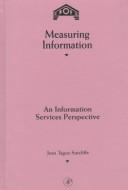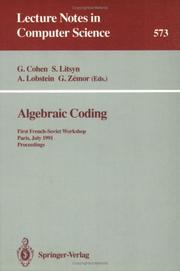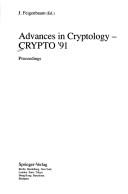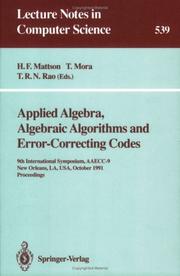| Listing 1 - 10 of 27 | << page >> |
Sort by
|
Dissertation
ISBN: 9056820362 Year: 1996 Publisher: Heverlee Katholieke Universiteit Leuven. Faculteit der Toegepaste Wetenschappen. Departement Elektrotechniek. Afdeling Elektronica, Systemen, Automatisatie en Technologie
Abstract | Keywords | Export | Availability | Bookmark
 Loading...
Loading...Choose an application
- Reference Manager
- EndNote
- RefWorks (Direct export to RefWorks)
Proefschriften --- Thèses --- Academic collection --- 681.3*I42 --- #BIBC:T1996 --- Compression (coding): approximate methods; exact coding (Image processing)--See also {681.3*E4} --- Theses --- 681.3*I42 Compression (coding): approximate methods; exact coding (Image processing)--See also {681.3*E4}

ISBN: 0126826609 Year: 1995 Volume: *26 Publisher: San Diego Academic Press
Abstract | Keywords | Export | Availability | Bookmark
 Loading...
Loading...Choose an application
- Reference Manager
- EndNote
- RefWorks (Direct export to RefWorks)
Library research --- 02:51 --- Information science --- -681.3*H11 --- Communication --- Information literacy --- Library science --- Bibliometrie --- Statistical methods --- Systems and information theory: value of information--See also {681.3*E4} --- 681.3*H11 Systems and information theory: value of information--See also {681.3*E4} --- 02:51 Bibliometrie --- 681.3*H11 --- Informetrics
Multi
ISBN: 9056821458 Year: 1998 Publisher: Heverlee Katholieke Universiteit Leuven. Faculteit der Toegepaste Wetenschappen
Abstract | Keywords | Export | Availability | Bookmark
 Loading...
Loading...Choose an application
- Reference Manager
- EndNote
- RefWorks (Direct export to RefWorks)
Academic collection --- #BIBC:T1998 --- 681.3*E4 --- Coding and information theory: data compaction and compression; formal modelsof communication; nonsecret encoding schemes--See also {681.3*H11} --- Theses --- 681.3*E4 Coding and information theory: data compaction and compression; formal modelsof communication; nonsecret encoding schemes--See also {681.3*H11}
Dissertation
ISBN: 9789460180408 Year: 2009 Publisher: Leuven Katholieke Universiteit Leuven
Abstract | Keywords | Export | Availability | Bookmark
 Loading...
Loading...Choose an application
- Reference Manager
- EndNote
- RefWorks (Direct export to RefWorks)
Deze thesis bestudeert het onderwerp 'white-box cryptografie' (WBC), dat zich op software-implementaties van cryptografische primitieven (zoals vercijferingsschema's) concentreert. Traditioneel worden cryptografische primitieven ontworpen om gegevens en sleutels te beschermen tegen 'black-box' aanvallen. Hierbij heeft de aanvaller kennis van het algoritme en kan hij de invoer naar en de uitvoer van het primitief bestuderen. Maar hij heeft geen zicht op de interne werking van een sleutel-geinstantieerd primitief tijdens de uitvoering (zwarte doos). In deze thesis beschouwen we een aanvalsmodel waarbij de aanvaller onbeperkte toegang heeft tot de software-implementatie: het white-box model. Het doel van white-box implementaties is om in een dergelijke context een bepaald niveau van bescherming te bekomen. Het belangrijkste deel van deze thesis behandelt het nagaan van de veiligheid van white-box implementaties. Deze bijdrage is tweezijdig. Allereerst worden de praktische white-box implementaties van DES en AES vercijferingsalgoritmen beschreven, en hun cryptanalyse voorgesteld. Deze resultaten worden verder uitgebreid naar generische aanvallen, wat het pad opent naar nieuwe technieken. Aangezien nog geen formele definities van white-box cryptografie voorgesteld werden en de praktische white-box implementaties zonder bewijs van veiligheid voorzien zijn, dringt zich een studie op naar het formeel definieren van white-box cryptografie. Dit is de tweede grote bijdrage. De studie van theoretische obfuscatie en bewijsbare veiligheid resulteert in een definitie van WBC, waarbij we de veiligheidsvereisten omvatten voor een bepaald cryptografisch primitief met geassocieerde veiligheidsnotie. Dit nieuw theoretisch model levert een context op, waarin de veiligheid van white-box implementaties bestudeerd kan worden, en leidt tot een aantal positieve en negatieve resultaten. Gezien de praktische mogelijkheden die kunnen voortvloeien uit WBC, beeindigen we deze thesis met een overzicht van een selectie van toepassingen en verwante onderzoeksdomeinen, aan welke dit onderzoek kan toe bijdragen. This thesis studies the topic of 'white-box cryptography' (WBC), which focuses on software implementations of cryptographic primitives (such as encryption schemes). Traditionally, cryptographic primitives are designed to protect data and keys against 'black-box' attacks. In such a context, an adversary has knowledge of the algorithm and may examine various inputs to and outputs from the system, but has no visibility on the internal details of the execution of a key instantiated primitive. In contrast, the goal of white-box implementations is to provide a degree of robustness against attacks from the execution environment. In such an environment, an adversary has unrestricted access to the software implementation. The main part of this dissertation covers the security assessment of white-box implementations. This contribution is two-fold: we study practical white-box techniques and perform a theoretical study. First, a study is conducted on the practical white-box implementations of DES and AES encryption algorithms, which includes their cryptanalysis. Subsequently, generic cryptanalysis results are described, which opens a discussion towards white-box design strategies. Since no formal definitions of white-box cryptography were presented before and the proposed white-box implementations did not come with any proof of security, we initiate a study towards a theoretical model for white-box cryptography. The study on formal models of obfuscation and provable security leads to a definition where we capture the security requirements of WBC defined over some cryptographic scheme and a security notion. This new theoretical model provides a context to investigate the security of white-box implementations, which leads to a number of positive and negative possibility results. Considering the practical interest of research in WBC, we conclude with an overview of a selection of applications and related research fields that might benefit from and contribute to this research topic. praktische mogelijkheden die kunnen voortvloeien uit WBC, beeindigen we deze thesis met een overzicht van een selectie van toepassingen en verwante onderzoeksdomeinen, aan welke dit onderzoek kan toe bijdragen. and related research fields that might benefit from and contribute to this research topic.
Academic collection --- 654 <043> --- 681.3*E4 <043> --- Telecommunication and telecontrol (organization, services)--Dissertaties --- Coding and information theory: data compaction and compression; formal modelsof communication; nonsecret encoding schemes--See also {681.3*H11}--Dissertaties --- Theses --- 681.3*E4 <043> Coding and information theory: data compaction and compression; formal modelsof communication; nonsecret encoding schemes--See also {681.3*H11}--Dissertaties
Book
ISBN: 9514558820 Year: 1991 Volume: 15 Publisher: Helsinki Automation unit of Finnish Research Libraries
Abstract | Keywords | Export | Availability | Bookmark
 Loading...
Loading...Choose an application
- Reference Manager
- EndNote
- RefWorks (Direct export to RefWorks)
Database management --- Libraries --- -681.3*H11 --- Documentation --- Public institutions --- Librarians --- Data base management --- Data services (Database management) --- Database management services --- DBMS (Computer science) --- Generalized data management systems --- Services, Database management --- Systems, Database management --- Systems, Generalized database management --- Electronic data processing --- Computer programs --- -Congresses. --- Automation --- -Systems and information theory: value of information--See also {681.3*E4} --- 681.3*H11 Systems and information theory: value of information--See also {681.3*E4} --- Systems and information theory: value of information--See also {681.3*E4} --- 681.3*H11 --- Computer programs&delete& --- Congresses --- Database management systems

ISBN: 0387551301 3540551301 3540467394 Year: 1992 Publisher: Berlin New York Springer-Verlag
Abstract | Keywords | Export | Availability | Bookmark
 Loading...
Loading...Choose an application
- Reference Manager
- EndNote
- RefWorks (Direct export to RefWorks)
This volume presents the proceedings of the first French-Soviet workshop on algebraic coding, held in Paris in July 1991. The idea for the workshop, born in Leningrad (now St. Petersburg) in 1990, was to bring together some of the best Soviet coding theorists. Scientists from France, Finland, Germany, Israel, Italy, Spain, and the United States also attended. The papers in the volume fall rather naturally into four categories: - Applications of exponential sums - Covering radius - Constructions -Decoding.
-681.3*E4 --- Coding and information theory: data compaction and compression; formal modelsof communication; nonsecret encoding schemes--See also {681.3*H11} --- 681.3*E4 Coding and information theory: data compaction and compression; formal modelsof communication; nonsecret encoding schemes--See also {681.3*H11} --- Coding theory --- 681.3*E4 --- Congresses --- Congresses. --- Coding theory - Congresses. --- Information theory. --- Coding theory. --- Geometry, algebraic. --- Combinatorics. --- Telecommunication. --- Theory of Computation. --- Coding and Information Theory. --- Algebraic Geometry. --- Communications Engineering, Networks. --- Electric communication --- Mass communication --- Telecom --- Telecommunication industry --- Telecommunications --- Communication --- Information theory --- Telecommuting --- Combinatorics --- Algebra --- Mathematical analysis --- Data compression (Telecommunication) --- Digital electronics --- Machine theory --- Signal theory (Telecommunication) --- Computer programming --- Communication theory --- Cybernetics --- Algebraic geometry --- Geometry
Book
ISBN: 9014025211 Year: 1976 Volume: vol *39 Publisher: Brussel Samsom
Abstract | Keywords | Export | Availability | Bookmark
 Loading...
Loading...Choose an application
- Reference Manager
- EndNote
- RefWorks (Direct export to RefWorks)
Electronic data processing --- 681.3*H0 --- 681.3*H11 --- 681.3*K60 --- ADP (Data processing) --- Automatic data processing --- Data processing --- EDP (Data processing) --- IDP (Data processing) --- Integrated data processing --- Computers --- Office practice --- Computerwetenschap--?*H0 --- Systems and information theory: value of information--See also {681.3*E4} --- Computerwetenschap--?*K60 --- Automation --- Electronic data processing. --- 681.3*H11 Systems and information theory: value of information--See also {681.3*E4}

ISBN: 3540551883 0387551883 Year: 1992 Volume: vol 576 Publisher: Berlin New York Paris Springer-Verlag
Abstract | Keywords | Export | Availability | Bookmark
 Loading...
Loading...Choose an application
- Reference Manager
- EndNote
- RefWorks (Direct export to RefWorks)
681.3*E3 --- 681.3*E4 --- Data encryption: data encryption standard; DES; public key cryptosystems --- Coding and information theory: data compaction and compression; formal modelsof communication; nonsecret encoding schemes--See also {681.3*H11} --- 681.3*E4 Coding and information theory: data compaction and compression; formal modelsof communication; nonsecret encoding schemes--See also {681.3*H11} --- 681.3*E3 Data encryption: data encryption standard; DES; public key cryptosystems --- Computers --- Access control --- Congresses --- Cryptography --- Computers - Access control - Congresses. --- Cryptography - Congresses.
Book
ISBN: 2040042288 9782040042288 Year: 1974 Publisher: Paris : Dunod,
Abstract | Keywords | Export | Availability | Bookmark
 Loading...
Loading...Choose an application
- Reference Manager
- EndNote
- RefWorks (Direct export to RefWorks)
Theory of knowledge --- Systèmes, Théorie des --- System analysis. --- Analyse de systèmes --- System analysis --- #ABIB:dd.prof.E.TOLLENS --- 681.3*H11 --- Network theory --- Systems analysis --- System theory --- Mathematical optimization --- 681.3*H11 Systems and information theory: value of information--See also {681.3*E4} --- Systems and information theory: value of information--See also {681.3*E4} --- Network analysis --- Network science --- System Analysis --- Planification --- Systèmes, Théorie des. --- Planification.

ISBN: 3540545220 0387545220 3540384367 Year: 1991 Volume: vol 539 Publisher: Berlin New York Springer-Verlag
Abstract | Keywords | Export | Availability | Bookmark
 Loading...
Loading...Choose an application
- Reference Manager
- EndNote
- RefWorks (Direct export to RefWorks)
The AAECC conferences focus on the algebraic aspects of modern computer science, which includes the most up-to-date and advanced topics. The topic of error-correcting codes is one where theory and implementation are unifiedinto a subject both of mathematical beauty and of practical importance. Algebraic algorithms are not only interesting theoretically but also important in computer and communication engineering and many other fields. This volume contains the proceedings of the 9th AAECC conference, held in New Orleans, LA, in October 1991. Researchers from Europe, America, Japan and other regions of the world presented papers at the conference. The papers present new results of recent theoretical and application-oriented research in the field.
Algebra --- -Algorithms --- -Error-correcting codes (Information theory) --- -681.3*E4 --- Codes, Error-correcting (Information theory) --- Error-detecting codes (Information theory) --- Forbidden-combination check (Information theory) --- Self-checking codes (Information theory) --- Artificial intelligence --- Automatic control --- Coding theory --- Information theory --- Algorism --- Arithmetic --- Mathematics --- Mathematical analysis --- Data processing --- -Congresses --- Congresses --- Coding and information theory: data compaction and compression; formal modelsof communication; nonsecret encoding schemes--See also {681.3*H11} --- Foundations --- Algorithms --- Error-correcting codes (Information theory) --- Congresses. --- 681.3*E4 Coding and information theory: data compaction and compression; formal modelsof communication; nonsecret encoding schemes--See also {681.3*H11} --- 681.3*E4 --- Data processing&delete& --- Error-correcting codes (Information theory) - Congresses. --- Algebra - Data processing - Congresses. --- Algorithms - Congresses. --- Algebra. --- Information theory. --- Coding theory. --- Combinatorics. --- Discrete Mathematics. --- Theory of Computation. --- Coding and Information Theory. --- Symbolic and Algebraic Manipulation. --- Data processing. --- Combinatorics --- Data compression (Telecommunication) --- Digital electronics --- Machine theory --- Signal theory (Telecommunication) --- Computer programming --- Communication theory --- Communication --- Cybernetics
| Listing 1 - 10 of 27 | << page >> |
Sort by
|

 Search
Search Feedback
Feedback About UniCat
About UniCat  Help
Help News
News